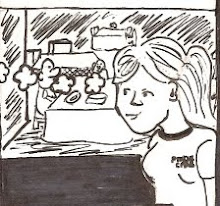When I think about September 11, 2001, my heart breaks. Not just for the victims and families of those who perished in the deadly attacks; but, for hundreds of thousands of Muslim families, who, overnight became enemies of the United States as well. These were families whose religion teaches peace, tolerance and charity. Yet, to many angry Americans they were marginalized and treated as monsters set on terrorizing innocent Americans.
This kind of hate is self-destructive and corrosive to society as a whole. It breaks down the trust between the many cultures which share this finite planet. In the wake of September 11, surveys and bumper stickers showed that a number of Americans supported bombing Muslim countries such as Afghanistan and Pakistan and letting "Allah sort out the rest." How could the peaceful, religious citizens who populated these regions, alongside the small sects of extremists, whose lives were ripped apart by our bombs not grow to hate America for the way we responded? And, so it goes: hate breeds hate and the cycles goes on until the political landscape of the world is one of independence and division.
In order for the world to live sustainably, this kind of political disunity cannot exist. The hate, which divides societies, makes finding global solutions to environmental problems impossible. The bombs, themselves, which light up the night skies over the sparsely populated wild regions of countries like Afghanistan, only add to the problems by destroying habitats in seconds. Even these seemingly inhospitable mountain regions have wilderness that is killed or displaced by these destructive blasts.
However, just as hate breeds hate, so also does love breed love. Most Americans want their country to be seen as one of respect, tolerance and generosity. Those who have travelled abroad, however, have seen that, in many countries, the opposite is true. And, little effort has been made by Americans, as a whole, to understand the histories and cultures of those beyond our borders. There are several possible reasons for this, which I will not go into here, but the bottom line is that most American's are unaware of where they fit in the greater picture of the world as a whole. And, thus, we exist as an island of beliefs and habits, disconnected from the rest of the world.
We, as a country, need a cultural awareness of other countries. We need a feeling of interconnectedness with the belief systems of the rest of the world. Where we demand respect of the world, we should instead offer it and we will then earn the respect that we crave.
In other words, if the world adopted the Golden Rule-- treat others as you want to be treated-- tolerance would be learned, and the difference which tear us apart would, instead, bring us together.
That is the only way that sustainability can be acheived. We can't have a smattering of sustainable communities operating independently around the globe while the rest of the world carries on with business as usual. That won't work. These unsustainable societies would continue to deplete the world's resources, until even the "sustainable" communities are no longer sustainable.
The bottom line is this: sustainability is a global issue and can only be solved by a united global community. The political boundaries established by centuries of conflict and division are hardly relevant when it comes to sustainability. Tearing down these boundaries begins with a lesson that most Americans learn as children-- that of the Golden Rule.
We like to think of ourselves as leaders of the "free world." And, as leaders we are responsible for starting this cycle of tolerance and respect. Leading by example has a far greater impact than militant imposition. Therefore, it is our perogative, as a country, to "be that change we wish to see in the world."
Subscribe to:
Post Comments (Atom)

No comments:
Post a Comment